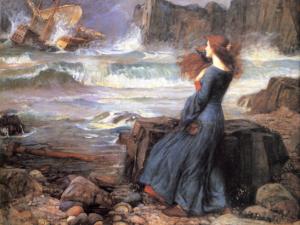“I love Rosalind!”
“Oh. Wait! I love Juliet!”
 And so starts the great tragedy Romeo and Juliet where the “hero” Romeo manages to mess up everyone’s life by his lack of chastity. Preparing to teach the play has reminded me of how healthy the play is: love, eros, and natural law all mix together, but when Romeo gets the mixture wrong . . . there is an explosion.
And so starts the great tragedy Romeo and Juliet where the “hero” Romeo manages to mess up everyone’s life by his lack of chastity. Preparing to teach the play has reminded me of how healthy the play is: love, eros, and natural law all mix together, but when Romeo gets the mixture wrong . . . there is an explosion.
Shakespeare was an entertainer, but like all great writers, he knew that learning is entertaining. There are many “lessons” in Romeo and Juliet. They are not sermons disguised as a play, but a play in which life is mirrored with all its truths. He wrote plays that are more effective than many sermons since most modern sermons are failed attempts at entertainment with a sermon hidden within the text.
Shakespeare grew up in a Christian nation, went to a Christian school, and wrote for an overwhelmingly Christian audience. Thank God, Shakespeare did not write “Christian theater” in the modern sense. He wrote theater and his worldview came out in the writing. Few have reflected a Christian worldview better!
Christian filmmakers should note: get a good writer. Make a movie not money making propaganda thinly disguised as a film. We are none of us Shakespeare, but we do not have to soil his heritage by forgetting his model!
In any case, Romeo starts the play in love with one girl, falls for a second, and by the end of living for love, he is dead, his beloved his dead, and his parents are tormented. Of course, in God’s good universe (that Shakespeare reflects) good comes of this tragedy as the civil war in the city is ended. Just as King Lear leaves England better off for the massive bloodshed of the nobles, the folly of Romeo and Juliet leaves Verona healthier.
Tragedy is a horrific way for a city or a society to learn that God and natural law will not be mocked.
Romeo is given good advice throughout the play, but he is impatient. He could marry Juliet and help heal the wounds of his city if he will just wait. But Romeo is as violent in love as he is in all his relationships . . . and he ends up a killer that kills himself.
Of course, once he abandons reasonable advice and patience, Romeo is also unlucky, but then those who plunge into matrimony against the laws of Nature and Nature’s God are always unlucky. He looks for a scheme to have his way immediately, finds it, and then sees it create homicide when things do not go perfectly.
Shakespeare is not afraid of erotic attraction: the play glories in it. He also knows it is no basis for marriage: a covenant that is both political and fecund. Marriage is security toward the future and the joining together of bloodlines, not just an act of love between two people. Romeo is more “modern” and thinks of marriage as a combination of eros and love. He forgets all other duties, toward Church, state, and family, in his desire for the consummation of his desires.
There is nothing wrong with marrying for love . . . it is devotedly to be desired, but love is not enough. Romeo will not wait and see if the blessings of church, state, and family will come and so he wrecks any possibility of happiness. That Juliet goes along with his desires is regrettable, but at least she demonstrates less flightiness in her affections.
Chastity considers the good of the beloved, the city, the family, and the church. Love without chastity (like love stripped of any virtue) ceases to be love and becomes selfishness. Love is greatest, but real love is known when it is guided by all the virtues toward God.
Romeo and his desires, even if they grant him more than eroticism, are cut off from the connections that could make his love whole. Church, family, and state have a role to play in this tragedy. The foolish family quarrel that rages is the root cause of the bad education Romeo has received. The failure of the city and the church to effectively quell the violence leads to violent young men like Romeo.
The city bred Romeo and Romeo is a judgment on the city.
Yet Romeo was a man and he could have escaped the plague of his education and his situation, and in fact healed his city, if he had just thought about his desires. He would not be lonely, live apart from the city and his beloved for a time, in order to heal the city and save the life of his beloved.
Romeo could have been a great man, but instead settled on being a tragic man. May we all avoid this choice in our own troubled times.
















